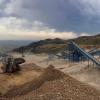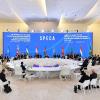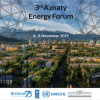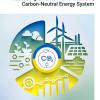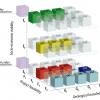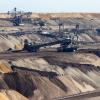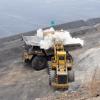Press Releases
Displaying Results 1 - 25 of 130
The United Nations Economic Commission for Europe (UNECE) and The United Nations Climate Change High-Level Champions (Climate Champions) have launched a call for advanced-stage clean energy projects in the Western Balkans, Central Asia, the Caucasus, Eastern and Southeast Europe to be presented to
Ahead of the Ukraine Recovery Conference in Berlin on 11 – 12 June 2024, UNECE Executive Secretary Tatiana Molcean visited Kyiv from 4 to 6 June to discuss UNECE support for the country’s reconstruction and recovery with Ukrainian government officials, the United Nations Country Team, the
To establish sustainable and ethical practices for sourcing critical minerals, it is crucial to prioritize human rights, gender equality, and youth engagement. It is also imperative to integrate protection of human rights into resource management. The central focus should be women’s empowerment
Accurate mineral reporting and classification in the global mining industry is needed to ensure transparency, reliability, and comparability of data, facilitating informed investment and decision-making by governments and all stakeholders for sustainable resource management practices.
This will
In Cornwall, United Kingdom, a pioneering initiative is underway to optimize resource management for critical raw materials projects. Applying the United Nations Resource Management System (UNRMS) is helping to transform the region's approach to resource extraction, processing, and sustainability.
Tackling emissions of methane now is essential to meet the Paris Agreement goal of limiting temperature rise to 1.5 °C above pre-industrial levels by 2050. With political momentum building fast for methane mitigation and, as emissions measurement continues to sharpen through satellite and other
Faced with increasing impacts of climate change, pollution and biodiversity loss, which together constitute the “triple planetary crisis”, no country can act alone. Like nature itself, these challenges know no borders, which makes international cooperation a crucial part of action to address them
The global transport sector has the highest reliance on fossil fuels of any sector. In 2021 it accounted for almost one fourth of global greenhouse gas (GHG) emissions. The road transport sector, including passenger cars, buses, heavy and light duty commercial vehicles, is the major GHG contributor
Critical Raw Materials (CRM) like lithium, nickel, cobalt, copper, manganese, graphite and rare earth elements are crucial for renewable energy technologies like solar panels, wind turbines and for battery production, driving the global shift to electrification. Yet with surging demand,
Climate investments of $1.6 to $3.8 trillion per year are needed from 2020 to 2050 to meet the objectives of the Paris Agreement, according to the United Nations Framework Convention on Climate Change (UNFCCC). While green finance has more than tripled since the adoption of the Paris Agreement in
Meeting for the first time since the United Nations Special Programme for the Economies of Central Asia (SPECA) was created in 1998, the Heads of State and Government of SPECA participating States adopted the Baku Declaration. The declaration endorses a roadmap for the digitalization of multimodal
Groundwater, an invaluable source of freshwater, faces numerous challenges, including overexploitation, pollution, and insufficient data to assess groundwater quantity and quality. UNECE has opened a public consultation on the draft supplemental specifications for groundwater resources for the
New loan options with Performance-Based Payments (PBPs) will be made available to Small and Medium-sized Enterprises (SMEs) and seven target groups of creditworthy but underserved individuals/households from North Macedonia. The loans are to be used for investments in renewable energy (RE) and
Critical Raw Materials (CRMs) are essential for the production and deployment of low-carbon technologies, such as wind turbines, solar panels, electric vehicles, and batteries. However, they also pose significant challenges regarding supply, demand, environmental and social impacts, and governance
To meet the objectives of the Paris agreement, energy systems will need to undergo a profound transformation and become fully resilient, finding the right balance between the three pillars of resiliency (as defined in UNECE’s publication “Building Resilient Energy Systems”): energy security,
A milestone for advancing sustainable resource management worldwide has been reached with the endorsement of the United Nations Resource Management System (UNRMS) by the United Nations Economic and Social Council (ECOSOC). UNRMS is a set of principles and requirements that guide the planning,
The war in Ukraine, which has caused immense suffering and resulted in the destruction of critical infrastructure, demands urgent action to rebuild the country and its energy system.
Today, Ukraine heavily depends on fossil fuels, which accounted for some 70% of its primary energy supply in
Today, fossil fuels account for 95% of total energy supply in the 5 countries of Central Asia - - Kazakhstan, Kyrgyzstan, Tajikistan, Turkmenistan, and Uzbekistan - that are members of UNECE.
A massive shift away from fossil fuels and towards renewable sources will be needed for countries to
The massive shift to renewable energy and green technologies needed to meet the obligations under the Paris Agreement will require an exponential increase in the use of critical raw materials (rare earths, lithium, cobalt, nickel, copper, silicon etc.) by 2050.
The EU currently relies almost
A UN Framework to improve the efficiency and effectiveness of energy resource management is sparking significant interest from geothermal experts, signaling strong potential to unlock its contribution to climate action and sustainable development.
The United Nations Framework Classification for
At EU Raw Materials Week, European decision-makers have joined calls for governments to further implement the UN frameworks on sustainable resource management. Given the climate emergency and the urgent need for profound low-carbon transitions, there is a rapidly growing demand for critical raw
The United Nations has warned the world will fall short on the 1.5-degree C average increase in temperatures target without rapid and large-scale action to tackle greenhouse gas emissions from the energy intensive industries, which account for about 25% of total CO2 emissions globally and 66% of
Heatwaves and droughts are drying rivers and freshwater sources, spreading desertification and accelerating soil erosion. Food production is under severe threat everywhere, raising the spectre of famine and mass starvation. As nature gasps for survival, people scramble to get hold of diminishing
The world is in the midst of a deep energy crisis and in need of urgent energy transition. However, this transition cannot happen without massive quantities of critical raw materials (CRMs) needed to deploy the low-carbon technologies required for climate change mitigation and adaptation, said
The Ministry of Natural Resources of the People’s Republic of China has a long-standing cooperation with the United Nations Economic Commission for Europe to promote the harmonization, development and connectivity of global solid mineral and petroleum classification standards.
The United Nations










